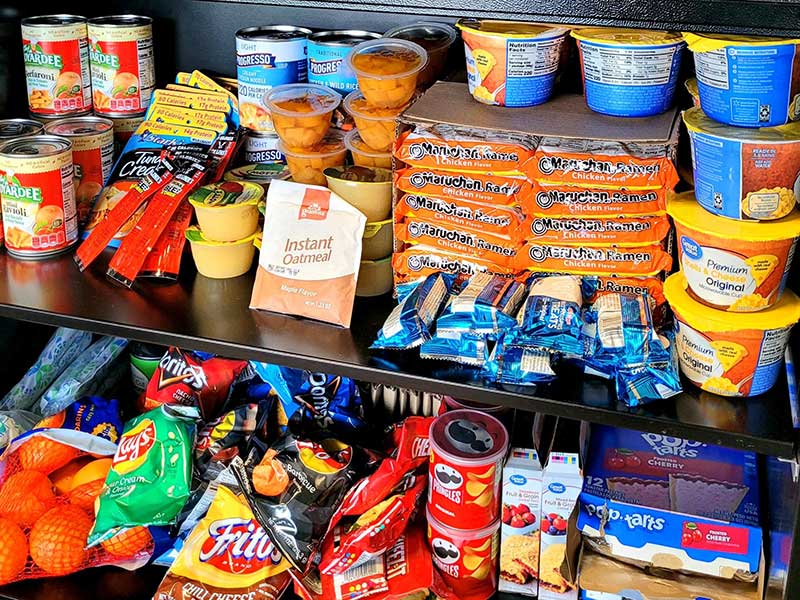
When is a peanut butter sandwich more than just a sandwich? When it is the difference between spending all day in class hungry or having the energy and focus needed to take on longer, more advanced courses and labs.
The hub for many engineering students at the U of A is the student lounge. That was especially true when students were returning to campus after the easing of COVID-19 restrictions. It was in one of the lounges, Bell Engineering 3008, that Jonesboro senior Shirley Vega, president of the IEEE Women in Engineering affinity group, noticed not all students had the same resources when it came to food and meals.
"The college encouraged people to be in the student lounge to work together and study together," Vega stated. "But not everyone has the ability to leave and go to lunch when they need to."
Vega realized that food insecurity can be a major stressor for some students, in addition to the stress commonly felt during the semester.
"Food insecurity was bigger than I expected. I knew there was a need, but I didn't see it every day," Vega said.
Vega reached out to IEEE Power Electronics Society President Jeremiah Wimer to collaborate on a solution. Wimer, a senior electrical engineering major from Fayetteville, described the challenges students face as they advance through their studies.
"When you get to be a junior or senior, you find yourself faced with back-to-back classes and labs that can last through the day," Wimer said. "You don't want to be hungry all that time."
With this in mind, Vega conceived the idea of providing students with a source of food and other basic needs. She also wanted to make it accessible to anyone, regardless of classification or area of study.
 With assistance from the university's Jane B. Gearhart Full Circle Food Pantry, Vega and Wimer put their plan into action. A shelving unit was installed in the lounge and stocked with nonperishable food items such as canned pastas and soup, ramen packs and of course, peanut butter and jelly. The pantry also stocks personal care products such as feminine hygiene items.
With assistance from the university's Jane B. Gearhart Full Circle Food Pantry, Vega and Wimer put their plan into action. A shelving unit was installed in the lounge and stocked with nonperishable food items such as canned pastas and soup, ramen packs and of course, peanut butter and jelly. The pantry also stocks personal care products such as feminine hygiene items.
It was important to Vega to make access to the items in the pantry easy and discreet, and the student lounge was the perfect spot. Vega, Wimer and others put up posters, posted on social media and used word of mouth classroom conversations to get the message out about the mini-pantry. The response was immediate. Most of the food items stocked in the mini-pantry come from the university food pantry, and the items are restocked every Friday. There have been donations made directly to the mini-pantry as well.
Because food insecurity is a sensitive subject, a QR code is available for students to privately and discreetly request specific items from the university food pantry. Those items can be picked up at the food pantry or delivered to the mini-pantry at Bell Engineering Center 3008 during scheduled restocks.
While Wimer identifies Vega as the driving force behind this project, Vega is quick to credit both Wimer and the university food pantry for their collaboration.
"This was not a one-person project," Vega stated. "A lot of people are working to make sure it works like it's supposed to."
As a senior quickly closing in on graduation, Vega hopes that future students will follow up with this project and keep the mini-pantry going. As a nontraditional student returning to college after more than a decade, Vega is acutely aware of how stressful college can be, especially if there are challenges away from school that can interfere with studies.
"If we can take one worry away, we want to do that," Vega said.
Peanut butter and jelly to the rescue.
Topics
Contacts
Amanda Andrews, administrative specialist
Department of Electrical Engineering
479-575-5575, Ara019@uark.edu
Jennifer P. Cook, director of communications
College of Engineering
479-575-5697, jpc022@uark.edu